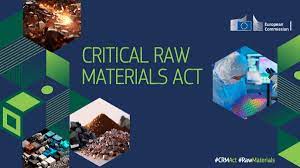Critical Raw Materials Act:

The European Union Parliament recently voted in favour of the Critical Raw Materials Act.
- Critical raw materials (CRMs) are raw materials of high economic importance for the EU, with a high risk of supply disruption due to their concentration of sources and lack of good, affordable substitutes.
- The CRM Act identifies a list of 30 critical raw materials, including lithium, cobalt, nickel, rare earths, and magnesium.
- Objectives of the Act:
- Increase and diversify the EU’s CRMs supply;
- Strengthen circularity, including recycling;
- Support research and innovation on resource efficiency and the development of substitutes;
- Setting benchmarks by 2030 for domestic capacities:
- The Act sets these benchmarks along the strategic raw materials value chain and for the diversification of EU supplies
- at least 10% of the EU’s annual consumption for extraction;
- at least 40% of the EU’s annual consumption for processing;
- at least 15% of the EU’s annual consumption for recycling;
- no more than 65% of the EU’s annual consumption from a single third country;
- The Act will reduce the administrative burden, streamlining permitting procedures for critical raw materials projects in the EU.
- To ensure supply chain resilience, the Act creates CRMs for supply chain monitoring and stress-testing, coordinates strategic stocks and sets risk preparedness obligations on large companies producing strategic technologies.
- In addition to a list of CRMs for the whole EU economy, it lists strategic raw materials, which are those most crucial for strategic technologies used for green, digital, defence and space applications.




